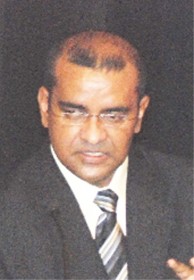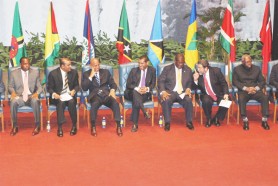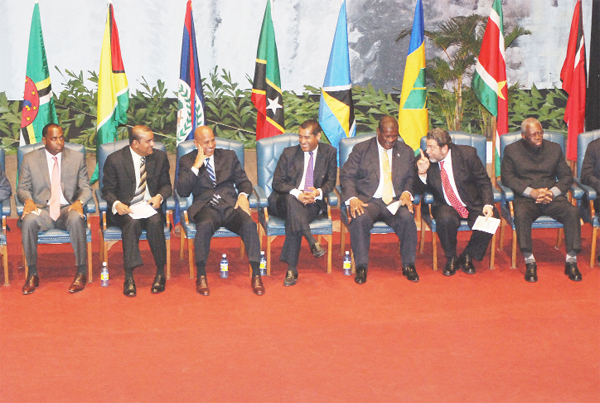Agrees ‘ appropriate measures, incentives’ to woo private sector participation
The financial and economic cost of high dependency on extra regional food imports and mounting concern over the region’s food security has finally galvanized Caribbean Community (CARICOM) member countries into a comprehensive reassessment of the significance of the region’s agricultural sector.

At the conclusion of last week’s 30th Summit of CARICOM Heads of Government in Georgetown, regional leaders ‘rolled out’ the Liliendaal Declara-tion, on Agriculture and Food Security in which they both outlined what the Declaration described as the ”key binding constraints” that have impeded the development of the region’s agricultural sector and called on their “development partners” to support them in an endeavour that resembles a comprehensive conceptual refashioning of the sector. Regional Heads, the Declaration said, renewed their “commitment to pursue a strategic approach to transforming the agriculture sector into an internationally competitive sector with increased capacity to contribute to the sustained economic development of the region, the economic livelihood of entrepreneurs, the rural sector and to food and nutrition security.”
And while Caricom states have been accused in the past of allocating far too little financial resources to their respective agricultural sectors the Georgetown meeting of regional Heads committed them ‘to the provision of the necessary financial and other resources to ensure internationally competitive market-led production and the identification and effective employment of the appropriate policies and strategies which will bring about the desired improvements to the sector, including the agri-business sector.

While observers, including the regional farming community, the business sector and potential observers will be keen to see the actualization of the broad commitments given in the Liliendaal Declaration, the document, significantly, also acknowledges both the strategic errors and constraints that have inhibited the potential of agriculture in the region. Here in Georgetown, it will be seen as a critical though not conclusive breakthrough for the persistent lobbying of President Bharrat Jagdeo, the region’s lead spokesperson on agriculture, whose Jagdeo Initiative evidently provided much of the framework for the fashioning of the regional Declaration.
The Declaration attributes the failure of the region, so far, to fashion an agricultural sector that can reduce food imports and increase export earnings to a number of factors including its own indifference to research and development, outdated and inefficient agricultural health and food safety systems, weak land, water distribution and management systems and inadequate transportation systems, particularly for perishables. The Declaration also acknowledges that the region’s failure to fashion a modern agricultural sector has also been due to failure to institute efficient risk management measures as well as deficiencies in market information and intelligence systems.
Meanwhile, the Declaration having cited both “weak financing” and “inadequate levels of new investment in the sector as further factors inhibiting its growth, Heads of Government agreed to “increase budgetary allocations to the sector as well as to seek to encourage greater private sector involvement in agriculture.
Last year’s US$3b regional food bill served to chasten the Community and helped to trigger the hosting here by President Jagdeo of a major multi-stakeholder forum on food security which attracted participants from several CARICOM territories as well as local banking, insurance and other private sector representatives. While the push for greater emphasis on agriculture by President Jagdeo has, until now, failed to secure a fulsome response either from other CARICOM countries or from regional or extra-regional investors, the Guyana Private Sector Commission (PSC) has signalled its support for the reinvigoration of Guyana’s agricultural sector by establishing an agricultural sub-committee charged with promoting greater business sector involvement in agriculture and agro processing. Last week, Chairman of the sub-committee Beni Sankar told Stabroek Business that he was currently coordinating an initiative that could see several business houses participating in a joint venture exercise with Neal and Massy which has established an experimental agricultural project at Mon Repos.
The Liliendaal Declaration itemizes a number of what it describes as “priority regional actions in agriculture” which it says will focus on, among other things, region-wide upgrading of facilities and services for trade in agricultural commodities, creating a regional agricultural health and safety system and developing “appropriate policies and incentives” to encourage greater private sector involvement in the agricultural sector. Through the Declaration, CARICOM Heads also agreed to address the long-standing problem of inadequate transportation that has inhibited both intra regional trade in agricultural goods and extra regional food exports.
Meanwhile, the Declaration also recognizes what it describes as “the critical role” that the regional fisheries sector plays in the livelihood and well-being of the coastal communities. It also alludes to the value of the industry to the food security needs of the people of the Caribbean as well as “the economic benefits that can be derived from the sector.”

